TV Station NHK
 Maths Wonderland | Maths Wonderland
Maths Wonderland | Maths Wonderland
ED089800![]()
ワンダー数学ランド [NHK]
![]()
![]()
![]()
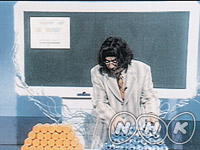
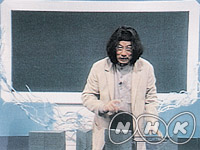
|Length : 25min. x7 |Year : 1998 |
The mysteries of math unraveled
Maths Wonderland invites participation from the audience when solving complex mathematical formulae and is an aid is dispelling the mysteries most people associate with mathematics. Professor Jin Akiyama uses various kits and devices to prove formulae and theorems, a method students are bound to find fascinating.
1. The Clever Way to Count - The Sum of Whole Numbers -
2. Use Your Wits to Measure - Volume of the Pyramid & Prism -
3. Fantastic Pythagoras - Applications of the 3 Squares Theorem -
4. Front? Back? Then What? - The Characteristics of a Curved Surface -
5. Balance is Everything - Centre of Gravity -
6. Brilliant Spins - Inscribed Circles -
7. Let's Make a Square Hole - The Properties of a Certain Shape -
 Whiz Bang Science | Whiz Bang Science
Whiz Bang Science | Whiz Bang Science
ED079600![]()
わくわくサイエンス [NHK]
![]()
![]()
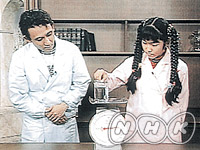
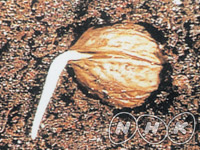
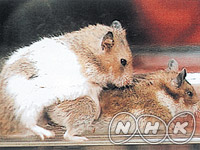
|Length : 15min. x15 |Year : 1996 |
An Inspiring Introduction for Scientific Seekers
Developed with the aim of fostering the ability to think scientifically, this series introduces basic principles in a way that is both understandable and engaging for students in the upper grades of primary school. The presenter, herself a primary school student, and her adult assistant apply scientific thinking and research methods to a wide range of fascinating questions. Eye-opening experiments and clever observations aid both in arriving at answers and in capturing the interest of young viewers. An invaluable introduction to the world of science, created specifically for children from 10 to 12 years old.
1. Living seeds
2. How Bean Sprouts Grow
3. How Fish Are Born
4. Food for Fish
5. How Animals Reproduce
6. How Plants Reproduce
7. The Temperature and the Sun
8. Moon and Sun Paths
9. Why the Moon Changes Shape
10. What Happens When Substances Dissolve
11. The Beauty of Crystals
12. Levers in Everyday Life
13. The Pendulum Principle
14. Collision Power
15. Now It's Your Turn
 Only One Earth | Only One Earth
Only One Earth | Only One Earth
ED059700![]()
たったひとつの地球 [NHK]
![]()
![]()
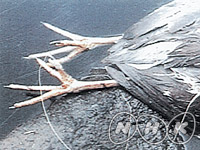
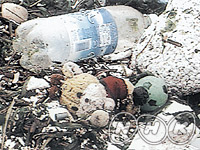
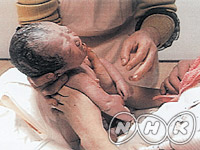
|Length : 20min. x10, 15min. x10 |Year : 1997 |
Placing environment concerns above convenience
In the pursuit for a more comfortable life, humans rarely consider the damage to other living creatures and to the environment. This series questions today's values and lifestyles when measured against the resulting pollutants, waste and blight of natural resources. From an environmental perspective, we are taken on a journey spanning the ocean depths to deep forests and made to re-examine man's impact on nature. Suggestions on how to care for our planet and its finite resources are incorporated into each program, hopefully encouraging us to change our habits and way of life.
1. Creatures that Have Eaten Garbage
2. How Far Can Recycling Go ?
3. The Sleepless City
4. The Ocean's Forests
5. Vegetables for All Seasons
6. The Forest's Secret
7. The Dead Forest
8. A Doctor for Wild Animals
9. A Child is Born!
10. Feeding the Cranes
11. The Water Pouring into the Seas
12. Chase the Litter!
13. Let's Think about Plastic Bottles
14. People and Beech Forest
15. A Story about a Paddy-Field
16. White Stork, Fly Leisurely!
17. Invitation to the 'Dragonfly Kingdom'
18. Making Healthy Soil
19. Hand-made Electric Car, Go!
20. The Food in Japan
Nos.1-10: 20min. each
Nos.11-20: 15min. each
 Junior High School Science | Junior High School Science
Junior High School Science | Junior High School Science
ED039300![]()
ステップ&ジャンプ [NHK]
![]()
![]()
![]()
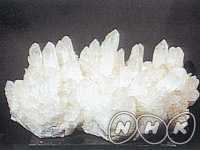
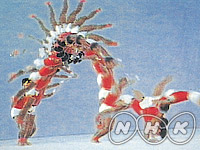
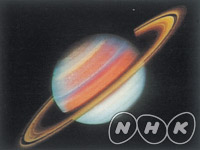
|Length : 15min. x30 |Year : 1993 |
NHK's Science Program Group has accumulated an impressive amount of scientific material over the years in a variety of fields. "Junior High School Science" draws on this extensive library using computer graphics and video footage of actual experiments and research to improve young people's understanding of biology and physical geography - the micro and macro worlds that are background for all human existence. The series covers a range of subjects from a variety of perspectives. It is a fascinating introduction to natural phenomena and the scientific laws and principles that govern them.
[Chemistry]
1. Crystallization
2. Chemical Compounds and Decomposition
3. Burnable Metals
4. Unchanging Mass
5. Properties of lons
6. Electrolysis
7. Separation of Gases
[Physics]
8. Motion and Speed
9. Acceleration
10. Equilibrium of Force
11. Buoyancy
12. The Function of Force
13. Water Pressure
14. Slopes and Friction
15. Falling Motion
16. Work and Energy
17. Wave Transmission
18. Mirrors and Lenses
19. Gas Pressure
20. Magnets
[Biology]
21. Micro-Organisms
22. Reproduction in Plants
23. Digestion and Absorption
24. Blood Circulation
25. Reproduction
26. Biological Evolution
27. The Nervous System
28. Vertebrate Animals
[Physical Geography]
29. The Moon
30. Movement of the Planets
 Let's Tackle Scientific Problems | Let’s Tackle Scientific Problems
Let's Tackle Scientific Problems | Let’s Tackle Scientific Problems
ED029200![]()
はてなにタックル [NHK]
![]()
![]()
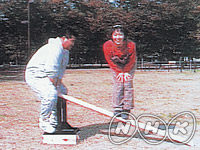
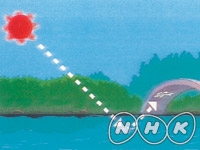
|Length : 15min. X7 |Year : 1992 |
This series of fifteen-minute science programs is a production of NHK. It has been prepared for children of ten years old with the goal of developing their familiarity with and cultivating in them a greater interest in science. Each program features a lively young woman named Mari who sets about tackling scientific problems serving as the children's eyes and ears.
The scientific phenomena addressed are varied and include the lever principle, the properties of light, air and combustion.
In each episode, an off-screen voice representing Mari's young brother Jiro helps Mari in solving problems and carrying out experiments and serves as a device to ask questions or express doubts that the young viewers can not raise.
1. How a Lever Works
2. How Levers Balance
3. Levers in our Dailly Lives
4. Light
5. Reflection of Light
6. Bending Light
7. Fire and Air














